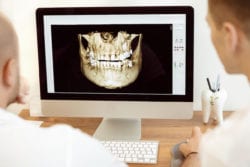
In addition to the problems smoking causes for your overall health, tobacco products also destroy your oral health. People who smoke have a higher risk of developing lung cancer, breathing problems, COPD, and other health conditions. Tobacco users also experience higher risk of losing teeth and developing mouth and throat cancer.
How Does Tobacco Affect My Teeth?
Many tobacco products like cigars, snuff, and chewing tobacco contain tiny abrasive particles that cause tooth enamel to wear down faster. Additionally, tobacco slows down your ability to heal, so these small abrasions to the enamel and gums will not heal as quickly as they should. Even smokers who have great oral hygiene cannot reverse these effects.
Tobacco use and smoking limits how effective dental treatments are. Smoking reduces blood flow, meaning that nutrients and oxygen do not reach the smaller blood vessels in the mouth to promote healing. Smokers also experience higher inflammation and increased bacteria in the mouth, making it difficult to replace lost teeth using restorative dental treatments.
Dental implants or bridges may not be an option for someone who smokes or uses tobacco because your remaining jawbone and teeth may have become weak from decay or an infection, and aren’t strong enough to support them. Research has shown a much higher rate of implant failure among smokers than in nonsmokers.
Smoking Lowers Your Ability to Fight Gum Disease
Smokers are twice as likely to develop gum disease than non-smokers, and they also have a hard time fighting the infection once it sets in. Using tobacco can cause gingivitis, a mild and reversible form of gum disease, to develop into an abscess much faster.
Smokers being treated for gum disease sometimes have a harder time coping with gum disease symptoms and treatment. Someone who smokes will likely feel more discomfort with gum disease than someone who does not smoke. The reduced blood flow to the gum tissues means more inflammation and less effective healing.
What About Chewing Tobacco?
Chewing tobacco, also known as snuff or smokeless tobacco, is one of the primary causes of mouth, throat, tongue, and pancreatic cancer. There are at least 28 cancer-causing chemicals in smokeless tobacco, and even though it is not meant to be swallowed, some of the juice created by chewing is still absorbed by the body.
This puts smokers at a much higher risk of cancer of the voice box, esophagus, bladder, and colon, as well as gum irritation and gum disease. Sugar is often added to enhance its flavor, increasing bacteria counts in the mouth and accelerating gum disease development. Teeth can also become sensitive due to enamel eroding from the abrasive materials in chewing tobacco.
Options For Restoring Your Oral Health After Smoking
Tobacco dependence is an addiction disorder and there are resources available to help you. Work with your dentist and health provider to find a solution that works for you. Even after refraining from smoking for a couple of weeks, many of the effects of tobacco use lessen and you will start feeling better.Ultimately, the effects of smoking and using tobacco on teeth can lead to tooth decay, gum disease and pose a challenge with restorative dentistry.
For more information or help restoring your teeth from the destruction caused by tobacco use, schedule with Ridgetop Dental in Reston, VA by calling 888.488.3049 or schedule online today.
